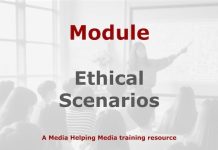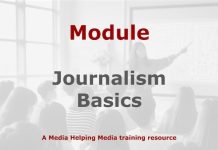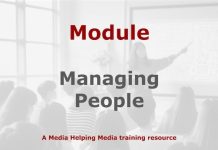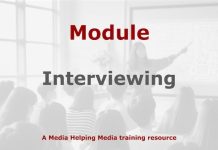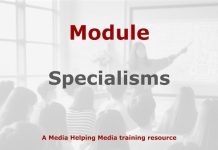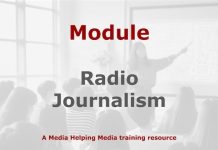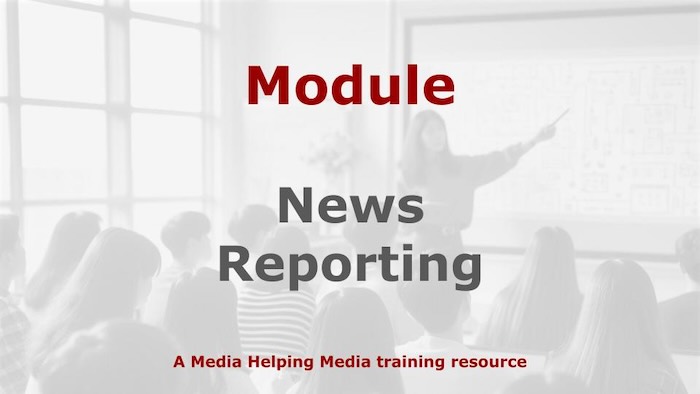 This six-week training module provides an outline for teaching students about researching, producing, and writing informative, accurate, and impartial news reports.
This six-week training module provides an outline for teaching students about researching, producing, and writing informative, accurate, and impartial news reports.
It’s designed to be adapted by college and university lecturers to address local teaching requirements.
Module: News reporting
- Target audience: Aspiring and entry-level journalists
- Duration: 6 Weeks
- Methodology:: Blended learning, combining self-study of provided resources with practical exercises, workshops, and peer feedback.
Module aims:
- To equip participants with a foundational understanding of what constitutes news and how to identify newsworthy events.
- To develop robust skills in news gathering, including researching, interviewing, and sourcing information ethically.
- To master the principles of structured news reporting, ensuring clarity, accuracy, and impartiality.
- To foster proficiency in crafting compelling and informative news stories for diverse audiences.
- To develop ethical journalistic practice and responsible reporting.
Teaching methodology
This module emphasises practical application, critical thinking, and a hands-on approach. It encourages active participation, problem-solving, and continuous feedback. Each week will involve:
- Directed self-study: Participants will engage with the provided online resources before scheduled sessions.
- Interactive lectures/discussions: Facilitated sessions to explain concepts, clarify doubts, and explore real-world examples.
- Practical workshops/exercises: Hands-on activities to apply learned skills, including simulated news scenarios, interviewing practice, and drafting news reports.
- Peer review and feedback: Opportunities for participants to critique each other’s work constructively.
- Case studies: Analysis of published news reports to understand best practices and common pitfalls.
- Reflective practice: Encouraging participants to assess their own learning and skill development.
Module timetable
Week 1: What makes a story?
- Core concepts: Understanding the definition of news, news values, and developing an acute “news sense” to identify potential stories.
- Learning objectives:
- Define “news” and articulate the key news values.
- Develop an intuitive ability to spot newsworthy events and situations.
- Understand the importance of local context in news identification.
- Resources for self-study (prior to week 1 session):
- How to spot a news story: https://mediahelpingmedia.org/basics/10-tips-for-spotting-a-news-story/
- Lesson: How to spot a news story: https://mediahelpingmedia.org/lessons/lesson-identifying-news/
- Developing and applying news sense: https://mediahelpingmedia.org/basics/news-sense/
- How news value is assessed: https://mediahelpingmedia.org/basics/what-is-news/
- Suggested activities/discussion points:
- Brainstorming session: “What’s news in our local area this week?”
- Analysis of various news headlines. Why were these deemed newsworthy? Which news values are prominent?
- Practical exercise: Participants are given a set of scenarios (e.g., a local council meeting agenda, a community group announcement) and asked to identify potential news stories and their angles.
- Discussion: The role of “news sense” versus checklist approaches to identifying news.
Week 2: Story development
- Core concepts: Moving from a raw news idea to a well-defined news angle. Understanding the evolution of a story and the importance of proactive journalism.
- Learning objectives:
- Learn how to refine a broad news idea into a specific, compelling news angle.
- Understand the iterative process of news story development.
- Appreciate the value of proactive journalism in uncovering deeper issues.
- Resources for self-study (prior to week 2 session):
- Developing important news angles: https://mediahelpingmedia.org/basics/how-to-find-and-develop-important-news-angles/
- Lesson: How to develop news angles: https://mediahelpingmedia.org/lessons/lesson-news-angles/
- The evolution of an original news story: https://mediahelpingmedia.org/basics/the-evolution-of-an-original-news-story/
- Lesson: How to develop a story: https://mediahelpingmedia.org/lessons/lesson-story-development/
- In-depth proactive journalism: https://mediahelpingmedia.org/management/proactive-journalism-ensuring-issues-are-fully-explored/
- Lesson: Proactive story development: https://mediahelpinghelpingmedia.org/lessons/lesson-proactive-journalism/
- Suggested activities/discussion points:
- Workshop: Taking the news ideas from Week 1 and developing several distinct news angles for each.
- Case study: Analysing an in-depth news investigation and identifying how it evolved from an initial idea.
- Discussion: How does proactive journalism differ from reactive reporting? What are the benefits and challenges?
- Practical exercise: Participants choose one of their developed angles and outline preliminary research questions.
Week 3: Gathering the facts – research and sourcing
- Core concepts: Essential research techniques, identifying credible sources, ethical considerations in sourcing, and the basics of interviewing.
- Learning objectives:
- Master effective online and offline research methodologies for news gathering.
- Differentiate between primary, secondary, and tertiary sources.
- Understand ethical guidelines for interacting with sources and protecting sensitive information.
- Develop foundational interviewing skills.
- Resources for self-study (prior to week 3 session):
- Organising effective newsgathering: https://mediahelpingmedia.org/management/newsgathering-tips-for-producing-great-content/
- Suggested activities/discussion points:
- Workshop: Practicing advanced search queries and evaluating website credibility.
- Role-playing: Conducting mock interviews with different ‘types’ of sources (for example: an official, a witness, a member of the public).
- Discussion: The importance of diverse sourcing for impartiality. What are the risks of relying on a single source?
- Practical exercise: Participants conduct a short research task for their chosen news angle, identifying at least three potential sources and preparing questions.
Week 4: Constructing a news story
- Core concepts: Understanding the inverted pyramid structure, identifying the essential elements of a news story (5 W’s and H), and planning the structure of a report.
- Learning objectives:
- Comprehend and apply the inverted pyramid structure to news writing.
- Identify and incorporate the five W’s and H (Who, What, Where, When, Why, How) effectively into a news report.
- Create a structured plan for a news story before writing.
- Resources for self-study (prior to week 4 session):
- How to create a structured news report: https://mediahelpingmedia.org/basics/how-to-create-a-story-plan/
- Lesson: How to create a structured news report: https://mediahelpingmedia.org/lessons/lesson-how-to-create-a-structured-news-report/
- Essential elements of a news story: https://mediahelpingmedia.org/basics/essential-elements-of-a-news-story/
- Lesson: Essential elements of a news story: https://mediahelpingmedia.org/lessons/lesson-pyramid-journalism/
- Suggested activities/discussion points:
- Analysis: Deconstructing various news reports to identify the inverted pyramid structure and the 5 W’s and H.
- Workshop: Participants take a set of facts and arrange them into an inverted pyramid structure, focusing on crafting a strong lead.
- Practical exercise: Using the research gathered in Week 3, participants create a detailed story plan for their news report, outlining the lead, key paragraphs, and supporting details.
Week 5: Crafting the report
- Core concepts: Principles of clear, concise, accurate, and impartial news writing. Understanding journalistic style, language use, and the importance of translation considerations.
- Learning objectives:
- Write clear, concise, and engaging news reports.
- Maintain accuracy and impartiality in language and tone.
- Understand the basics of journalistic style (for example: active voice, factual language).
- Recognise the challenges and best practices in journalistic translation.
- Resources for self-study (prior to week 5 session):
- Translation in journalism: https://mediahelpingmedia.org/basics/language-style-translation/
- Tool: News Story Checklist: https://mediahelpingmedia.org/basics/12-tips-for-producing-strong-news-stories/
- Suggested activities/discussion points:
- Writing workshop: Participants draft the first version of their news report based on their Week 4 plan.
- Peer review session: Participants exchange drafts and provide constructive feedback focusing on clarity, conciseness, accuracy, and impartiality.
- Discussion: Common writing pitfalls in news reporting (e.g., jargon, opinion, passive voice).
- Briefing on translation ethics and best practices for journalists covering international or multilingual stories.
Week 6: Review, refine, and ethical reporting
- Core concepts: The editing process, ensuring accuracy and impartiality through rigorous review, ethical considerations in reporting, and continuous improvement.
- Learning objectives:
- Apply effective self-editing and peer-editing techniques.
- Ensure factual accuracy, balance, and impartiality in a news report.
- Reinforce understanding of ethical responsibilities in news reporting.
- Present a polished, informative, accurate, and impartial news report.
- Resources for self-study (prior to week 6 session):
- Tool: News story checklist: (Revisit for final review) https://mediahelpingmedia.org/basics/12-tips-for-producing-strong-news-stories/
- Suggested activities/discussion points:
- Final editing workshop: Participants make final revisions to their news reports based on feedback and self-assessment, using the news story checklist.
- Presentation of final news reports: Participants share their completed reports, and the class provides a final critique.
- Discussion: A deeper dive into ethical dilemmas in reporting (for example: privacy, conflict of interest, sensationalism).
- Module wrap-up and career advice: Discussion on maintaining journalistic standards throughout a career and the importance of continuous learning.
- Assessment: Submission of the final news report as a demonstration of acquired skills.
Summary
This module aims to provide a robust foundation for aspiring journalists, equipping them with the essential skills and ethical understanding required to produce high-quality, impartial news reports in the UK context.
